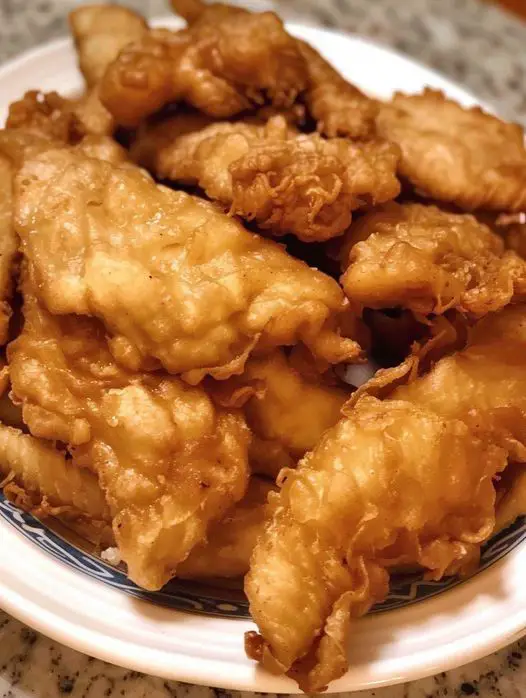Growing up, Fridays at our house meant one thing: fried fish night. The tantalizing aroma of crispy fish wafting through the air signaled the end of the week and the beginning of a family tradition that brought everyone together. The secret behind those perfectly golden, crunchy fish fillets? Mom’s cherished Long John Silver’s batter recipe. This recipe became a staple in our kitchen, turning ordinary fish into an extraordinary feast.
Mom’s Long John Silver’s batter recipe is more than just a method for frying fish—it’s a piece of family history. It reminds us of the laughter and conversations shared around the dinner table, the joy of a well-cooked meal, and the warmth of home. Every time I fry fish using this recipe, I’m not just cooking; I’m preserving a tradition and honoring a memory.
Whether you’re a seasoned cook or a beginner, this Long John Silver’s batter recipe is a fantastic way to bring a bit of nostalgia and a lot of flavor to your kitchen. So, gather your ingredients, heat up that oil, and get ready to enjoy a meal that’s sure to become a favorite in your household, just as it was in mine!!
The Magic of Long John Silver’s Batter
Long John Silver’s is famous for its crispy, flavorful fish, and mom’s version never failed to deliver the same delicious experience. The batter is light yet crunchy, creating a perfect coating that seals in the fish’s moisture while providing an irresistible texture. Here’s how you can recreate this classic batter at home and enjoy a taste of nostalgia.
INGREDIENTS:
- 1 cup all-purpose flour
- 1 tablespoon corn starch
- 1 teaspoon baking powder
- 1 teaspoon salt
- 1/2 teaspoon paprika
- 1/4 teaspoon onion powder
- 1/4 teaspoon garlic powder
- 1 cup cold water
- 1 large egg
- Vegetable oil for frying
- 2 pounds of fish fillets (cod, haddock, or your favorite white fish)
INSTRUCTIONS:
- Prepare the Fish:
- Pat the fish fillets dry with paper towels. This step is crucial to ensure the batter adheres properly to the fish.
- Season the fish lightly with salt and pepper. Set aside while you prepare the batter.
- Make the Batter:
- In a medium bowl, whisk together the flour, corn starch, baking powder, salt, paprika, onion powder, and garlic powder.
- In a separate bowl, beat the egg and then add the cold water. Stir to combine.
- Gradually add the wet ingredients to the dry ingredients, stirring until you have a smooth batter. The consistency should be similar to pancake batter—thick enough to coat the fish, but not too runny.
- Heat the Oil:
- Pour vegetable oil into a deep frying pan or Dutch oven to a depth of about 2 inches. Heat the oil over medium-high heat until it reaches 350°F (175°C). You can use a kitchen thermometer to monitor the temperature, or test it by dropping a small amount of batter into the oil—if it sizzles and turns golden brown within a minute, the oil is ready.
- Fry the Fish:
- Dip each fish fillet into the batter, allowing any excess to drip off before carefully placing it into the hot oil.
- Fry the fish in batches, being careful not to overcrowd the pan. Cook for 3-4 minutes on each side, or until the fish is golden brown and crispy.
- Use a slotted spoon to remove the fish from the oil and place it on a plate lined with paper towels to drain any excess oil.
- Serve and Enjoy:
- Serve the fish immediately with your favorite sides—fries, coleslaw, or a fresh garden salad are all great choices.
- For an authentic touch, pair it with tartar sauce or malt vinegar.
Tips for the Perfect Batter
- Cold Water: Using cold water in the batter helps create a light, crispy coating. Some even suggest adding ice cubes to the water to keep it as cold as possible.
- Resting Time: Allow the batter to rest for a few minutes before using it. This helps the ingredients to meld together and results in a better texture.
- Oil Temperature: Maintaining the right oil temperature is crucial. If the oil is too hot, the batter will burn before the fish is cooked through. If it’s too cold, the fish will absorb too much oil and become greasy.

Leave a Reply